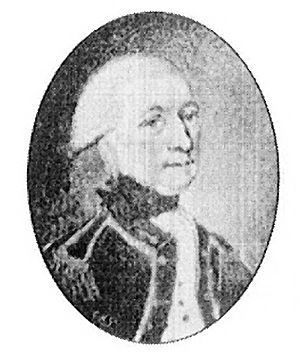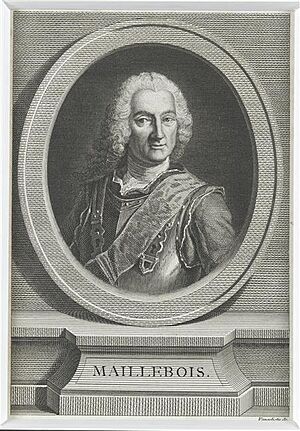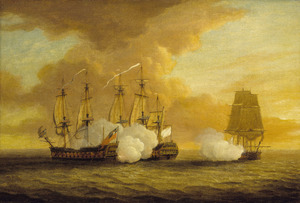John O'Sullivan (soldier) facts for kids
Quick facts for kids
Sir
John William O'Sullivan
|
|
|---|---|

Sir John O'Sullivan, from a portrait miniature
|
|
| Born | c. 1700 County Kerry, Ireland |
| Died | c. 1760 (aged 59–60) |
| Buried | |
| Allegiance | |
| Rank | Colonel |
| Battles/wars | |
| Relations | John L. O'Sullivan (great-grandson) |
Sir John William O'Sullivan (around 1700 – around 1760) was an Irish soldier. He spent most of his career serving France. However, he is best known for his part in the Jacobite rising of 1745. This was an attempt to put the House of Stuart back on the British throne. During the Rising, he was a key leader, helping to organize the Jacobite army. He had a big impact on the entire campaign.
Even though many books call him "O'Sullivan," he actually used the name "Sullivan" in his own letters.
Early Life and Career
John O'Sullivan was born around 1700 in a place called Cappanacush, near Kenmare in County Kerry, Ireland. His family's land, Dunkerron Castle, had been taken away by the government. This happened because of laws passed in 1652.
There isn't much information about his early life. What we know comes from a book called The Young Juba. This book was written in 1748 and is not always completely accurate.
At the time, laws called the Penal Laws made it hard for Irish Catholics to get good jobs or own land. So, like many others, O'Sullivan went to school in Paris and Rome. He might have even planned to become a priest. He later became a teacher for the son of a French leader, the Marquis de Maillebois. O'Sullivan went with him when the French helped take back Corsica in 1739. He also served in Italy and along the Rhine River during the War of the Austrian Succession.
The 1745 Jacobite Rising
In 1744, a French plan to invade Britain was called off. But Charles Stuart, who wanted to be king, started planning his own small landing in Scotland. He began buying weapons in early 1745. France gave him some help, often arranged by Lord Clare. O'Sullivan joined Charles's group in March 1745.
People said O'Sullivan was a very polite and engaging officer. Charles liked O'Sullivan and trusted his advice. In return, O'Sullivan was always loyal to Charles. He was deeply involved in planning the 1745 trip. He was one of the "Seven Men of Moidart" who landed with Charles on Eriskay.
The campaign started badly. A ship called the Elizabeth, carrying weapons and soldiers, had to turn back. It was damaged after fighting with HMS Lion. When Charles arrived, almost everyone told him to go back to France. But he convinced enough people to support him. He relied on a small group of fighters led by Donald Cameron of Lochiel and other chiefs. O'Sullivan remembered that Lochiel had "700 good men, but ill armed."
O'Sullivan became the main organizer for the Jacobite army. He handled soldiers, training, and supplies. As more people joined, O'Sullivan set up the army like a regular 18th-century force. It had officers, cavalry (horse soldiers), infantry (foot soldiers), artillery (cannons), and support teams.
At first, the army's command was shared between Lord George Murray and the Duke of Perth. But at the Battle of Falkirk and the Battle of Culloden, O'Sullivan was in overall charge.
There were many arguments about what to do next, especially after the Battle of Prestonpans. These arguments showed deep disagreements between the Scottish leaders and Charles's advisors, many of whom were Irish. The Irish wanted an independent, Catholic Ireland, which meant putting Charles on the British throne. Most of the Scottish soldiers were Protestants. They wanted to end the Union with England. They preferred to make their position stronger in Scotland. They didn't like the Irish exiles, who held French military ranks. If the Rising failed, the exiles would be treated as prisoners of war. The Scots, however, risked being executed and losing their lands.
O'Sullivan and Murray often disagreed. O'Sullivan was trained in France, and he thought Murray's military knowledge was old-fashioned. Murray, on the other hand, didn't think O'Sullivan was very good at his job. He once said he wished O'Sullivan had only been in charge of the army's baggage.
Some historians in the 1800s thought O'Sullivan was bad at his job. But actually, his work in organizing the army was very good. O'Sullivan was mainly responsible for planning the army's march south into England. Even though the army moved in three separate groups, it was very well planned. This was seen as excellent staff work.
Battle of Culloden
O'Sullivan's role in the Battle of Culloden is often debated. Many writers, especially in the 1800s, blamed him for the Jacobite defeat. For example, in the 1964 film Culloden, O'Sullivan is shown as a "complete fool."
The most common criticism is about his choice of the battlefield. However, O'Sullivan first picked a different spot. Other choices also had problems. In the end, the situation forced the army to fight at Culloden. There were not many other good options left besides fighting there. Most Jacobite commanders agreed to fight. Also, contrary to some stories, studies have shown that the Jacobite cannons at Culloden did have the correct size ammunition.
O'Sullivan's own writings say that he and John Drummond tried to gather the Jacobite soldiers to make an orderly retreat. A witness said that Charles wanted to lead a charge to try and win the battle. But O'Sullivan ordered Charles's guards to take him away from the field. O'Sullivan later wrote that he "continued his retreat, turning around from time to time with the small number of horse he had and those five and twenty men of Berwick’s." He left Scotland on a French ship in May. When he got back to France, he urged them to send a rescue mission for Charles.
Life After Culloden
Even though the Jacobites lost at Culloden, the Stuart family still thought highly of O'Sullivan. James Stuart made O'Sullivan a knight in 1746. He also received an Irish knighthood and a special title in 1753. Later, he had a disagreement with Prince Charles.
O'Sullivan's reputation in France did not seem to be hurt by the Jacobite defeat. The French government gave him a reward in October 1746. He was offered a high rank in one of the Irish regiments serving France. He continued to work as an officer in the French Army. He was at the Battle of Lauffeld in 1747, where the French defeated the British. He was also part of the force gathered for a planned French invasion of Britain in 1759.
We don't have much more information about O'Sullivan's later life. He married Louise Fitzgerald in 1749. They had a son named Thomas O'Sullivan. Thomas became a Major in the Irish Brigade in France. Later, Thomas moved to North America and served in the British Army. John L. O'Sullivan, an American journalist, was one of his descendants. Former British Prime Minister Margaret Thatcher also believed she was related to O'Sullivan through her father's side.
The last mention of O'Sullivan is from December 20, 1760. It is believed he died soon after this date. He is buried in a church in Annezin-les-Béthune, in Northern France.
|
 | James Van Der Zee |
 | Alma Thomas |
 | Ellis Wilson |
 | Margaret Taylor-Burroughs |




